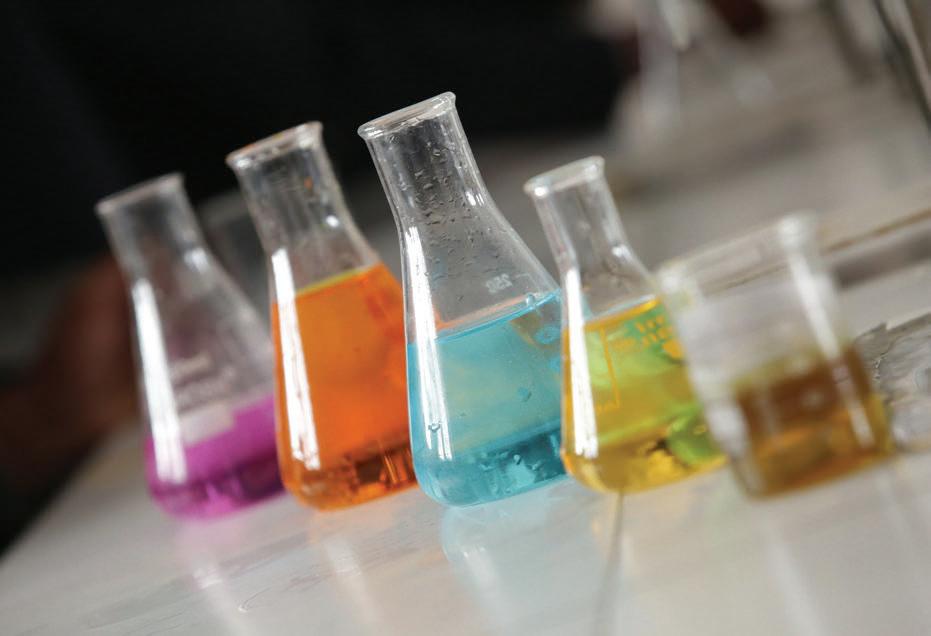
8 minute read
Additives
Antimicrobial additives: strength in numbers
Essentially invisible to the naked eye, antimicrobial plastic additives are the best protectors of plastic applications and will be ever so needed after the Covid-19 pandemic lockdowns ease worldwide, as the focus on staying safe becomes vital, says Angelica Buan in this article.
Advertisement
Keeping pathogens at bay with additives
More than the emergence of new pathogenic/ coronavirus strains, the world has a bigger beast to tame, which is the growing resistance of the human body to antibiotics and medications.
According to the World Health Organisation (WHO), rising bacterial infections are increasingly resistant to the medicines that can treat them. The WHO’s Global Antimicrobial Resistance and Use Surveillance System (GLASS) has aggregated data from more than 64,000 surveillance sites with more than 2 million patients enrolled from 66 countries across the world for this study.
WHO says high rates of resistance among antimicrobials frequently used to treat common infections, such as urinary tract infections or some forms of diarrhoea, indicate that the world is running out of effective ways to tackle these diseases. The inappropriate use of antibiotics during the Covid-19 pandemic could also exacerbate resistance, according to WHO.
The growth of the antimicrobial additives market is driven by rising awareness about healthrelated issues due to infections, viral outbreaks and other lifethreatening ailments
Additives
With consumer awareness increasing on these emerging public health threats, it is no surprise that the market for antimicrobial polymer additives in various applications is growing.
Over the next six years, the market size is likely to reach nearly US$4 billion, at a CAGR of 8% from 2019, according to a report by Acumen Research and Consulting. The growth is hinged on progressive awareness about health-related issues due to the rise in cases of infections, viral outbreaks and other lifethreatening ailments.
Sectors such as healthcare and medical, as well as consumer goods, construction, transportation, and packaging are witnessing brisk demand for antimicrobial plastics owing to their high antimicrobial activity, material strength, durability, and transparency. They are also used in non-toxic plastic equipment, the report said.
Creating a germ-free retail space
A study by the University of Arizona, US, has bared the perils of shopping, that is, the close encounters with disease-causing germs as a result of using shopping carts.
Based on its findings, fresh and raw food items may transfer bacteria such as E-coli or salmonella to carts; not to mention potentially contaminate the handles and cart parts by previous users who may have colds or flu. The latter was precisely why shoppers during the Covid-19 pandemic were told to sanitise their supermarket trolleys.
While thorough sanitisation of carts, especially the handles, is recommended, additional protection from antibacterial plastics can help to further reduce exposure from these pathogens.
Bact-Off, a self-care consumer packaging goods company, in partnership with Smart Plastic Technologies, a company engaged in the development of sustainable polymer additives, have introduced a snap-on plastic handle enabled with Smart Plastic's SPTek Gard antimicrobial additive. Given the current global health concerns, this product provides a solution to support shoppers seeking a clean and healthy in-store shopping experience, the company said.

Bactoff introduced a snap-on plastic handle for carts that is made with Smart Plastic's SPTek Gard antimicrobial additive
Additives

The SPTek Gard antimicrobial is added during Deterring infections in healthcare settings the cart handle’s film production process, Hospital-acquired infections (HAIs) are infections making it effective against Methicillin-resistant that develop within 48 hours (or after 30 days) staphylococcus aureus (MRSA), salmonella, while receiving treatment or upon admission to listeria, E-coli, and dozens of other organisms. a hospital or a healthcare facility. According to The cart handle offers an efficacy of up to a finding by the US Centre for Disease Control 99.999% in antimicrobial protection, Bact-Off said. and Prevention, nearly 1.7 million hospitalised
The additive technology enables bio-assimilation patients acquire HCAIs, yearly, during treatments (complete biodegradation of plastic), antimicrobial for other health issues, while more than 98,000 and antifungal protection, shelf-life extension, patients, or one in every 17 patients die due to odour elimination, gauge reduction, anti-counterfeit HAIs. tracing and more, says Smart Plastic. Thus, it is crucial that HAIs are prevented,
Meanwhile, close-contact areas such as at the either by sanitisation and infection control point-of-sale (POS) and check-out counters are measures or application of relevant zones for large concentration of germs. technologies.
In the UK, POS and visual merchandising Israel-headquartered speciality chemicals display specialist SDi Displays is providing company Tosaf has developed a new antiviral/ several retail outlets with bespoke units antimicrobial additive for polyolefin nonwoven containing UK additives company Addmaster’s fabrics and films, to be used in the production of in-built silver-based antimicrobial Biomaster disposable, medical, protective applications. technology. The latter provides an antimicrobial The company’s project, led by a three-person barrier to prevent the growth of harmful bacteria, team in Tosaf’s R&D Division: R&D Manager, offering round-the-clock protection and lasting Yafit Moyal; Programme Manager, Dr Moira for the entire life cycle of the unit, the company Nir; and Chief Innovation Scientist, Dr Evgeni said. Zelikman, was based out of the company’s Alon
The Biomaster technology can be easily Tavor, Israeli plant, one of the company’s 15 incorporated into any plastic, textile, paper, paint production sites located throughout the world. or coating. Tosaf is one of 35 companies chosen by the Israel Innovation Authority (IIA) and granted funds to develop solutions for the global fight against Covid-19.
The company, which manufactures colour and additive masterbatches and compounds for the plastics industry, expects its new product to contribute to the global efforts in clamping down the spread of the Covid-19, especially since face masks have become mandatory in containment measures. However, wearing masks does not fully protect individuals from this highly contagious virus, it said. “Blocked viral particles that do not penetrate the mask’s barrier can remain on the mask’s surface and infect individuals upon contact and disposal,” Tosaf furthers.
SDi Displays is providing several retail outlets with bespoke units containing UK additives company Addmaster’s in-built silver-based antimicrobial Biomaster technology
SDi has also manufactured 260,000 face guards layer of the mask for the most cost effective for use by retail staff, along with more than and efficient result. This, it says, can help destroy 10,000 pharmacy and checkout protective screens. viral particles that land on the outside surface The company has also produced 1,500 in-store of the mask, eliminating danger to its user. And hand sanitiser stations. These, according to the in cases where the mask user is already carrying company, offer hygiene solutions for businesses the virus, the applied additive can assist in killing that are making plans towards reopening upon viral particles that reach the outer layer from easing of the lockdowns, and when hygiene will be the inside, protecting others who may come in at the forefront of considerations. contact or are in proximity.
Most protective masks are made of several layers and Tosaf recommends that manufacturers apply the additive when producing the outer
Additives
Meanwhile, offering a biobased antimicrobial – the first product of its kind in the solution, Parx Materials developed a non-woven company’s architectural segment – can be used on a material for face masks that has the protective variety of internal surfaces, such as window frames, advantage against pneumonia bacteria. Parx ceiling tiles, metal office partitions, metal doors and recently obtained the confirmation from SGS, an elevator doors. It follows last year’s launch of the inspection, verification, testing and certification company’s antimicrobial Interpon AM range, which company, of the effectiveness of its materials is typically used on surfaces in hygiene conscious technology. environments such as hospitals, clinics, changing
The Saniconcentrates technology is rooms, schools and public transport. incorporated in a yarn and (melt blown) nonDaniela Vlad, Managing Director of AkzoNobel’s woven material used to produce face masks Powder Coatings business, calls it an “invisible to ward off superbugs such as the Klebsiella protection”, which can help make living and working pneumonia and Pseudomonas aeruginosa, which together more hygienic, amid the growing consumer are increasingly resistant to antibiotics, it said. concern for hygiene.
The technology allows the surface of products Integrating BioCote antimicrobial technology to become more resistant against microbes and into architectural powder coatings will create more bacteria; and the surface to be more resistant hygienic environments by reducing up to 99.99% of to bio-film adhesion. The company vouches microbes on protected surfaces, the company said, its technology does not contain biocides and adding that the antibacterial technology makes a mimics the defence mechanism of the human surface easier to keep hygienically clean. skin, demonstrating an antimicrobial performance of 99.9% or higher measures according to ISO 22196 or JIS Z2801.
Saniconcentrates are produced with the aid of a bodies own trace-element, like it is present in the top layer of the human skin. In skin, this trace-element is responsible for the defence mechanism against bacteria and viruses, Parx added.
Thus, hygiene and germprotection are the edge of AkzoNobel’s new enhanced powder coating. The Interpon D1000 and 2000 range of architectural powder coatings have the added antimicrobial functionality.
With cleanliness now on everyone’s agenda, the extra functionality offered by the inclusion of BioCote antimicrobial technology means that building interiors can now be given increased protection against microbes such as bacteria and mould – which can cause issues such as bad odours, staining or material degradation, according to the Dutch Parx Materials developed a non-woven material for face masks using a paints and performance coatings technology that allows the surface of products to become more resistant company. against microbes and bacteria The enhanced Interpon D AM

A suitable layer of protection for coatings
Antibacterial additives in coatings and paint applications are showing robust growth, especially in the automotive, healthcare and construction sectors, according to Acumen Research and Consulting.
These additives render long-lasting protection against microbe-causing stains and odours, as well as biodegradation, the report said.







